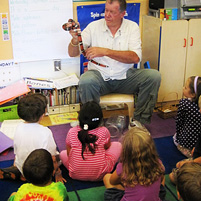Fear This

Are you afraid of snakes? What about spiders?
Ever wonder why?
David Rakison, a researcher at Carnegie Mellon University, has been studying babies' reactions to both and his findings offer some insight.
"When snakes or spiders are in their environment, babies tend to look at them. They are drawn to look at them because of an innate mental perceptual template that specifies their general appearance and shape," Rakison found.
"They don't have a similar tendency to look at, say, flowers or mushrooms."
So how do they learn that one should fear a snake and not approach it and cuddle it?
"We learn what emotion should be associated with these things by the reactions of the people around us," he explained.
Take Bindi, daughter of the late crocodile hunter Steve Irwin.
"Bindi is an excellent example of this. She grew up in an environment in which her caretakers did not show trepidation around dangerous animals," Rakison explained.
"Consequently, she has little or no fear of them and can work closely to help preserve and protect them."
The rest of us — most of us, anyway — learned otherwise. And Rakison found that girls learn to fear snakes and spiders quickly, while boys do not.
But Rakison's research does not imply that all women fear snakes and spiders.
"What it suggests instead is that evolution has prepared humans — and women, in particular — to learn to fear snakes and spiders when we see others exhibiting an appropriate negative emotion in their presence."
Why? Because we seem to learn rapidly the things that were threats in our evolutionary past.
"Women, for example, tended to gather food, so they were exposed to snakes and spiders," he said. "They learned quickly to be afraid of them because they needed to protect themselves and their babies."
Rakison's research sheds light on the nature of the human mind because it suggests we have a number of specialized psychological mechanisms that evolved to overcome adaptive problems — like evading predators or finding a mate.
It can also, in principle, help to stop certain phobias from ever developing.
Related Links: Infant Cognition Lab | BBC News Article
